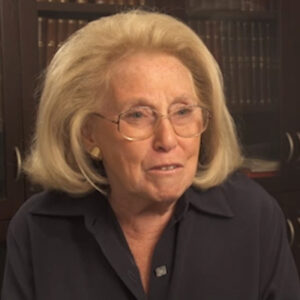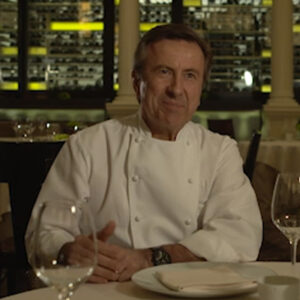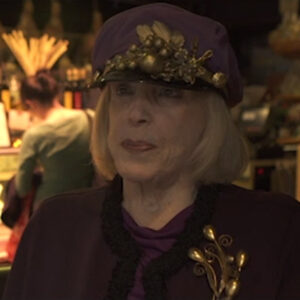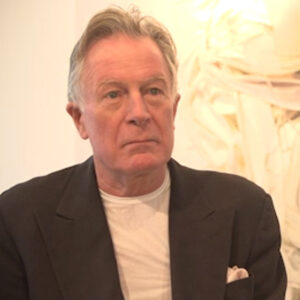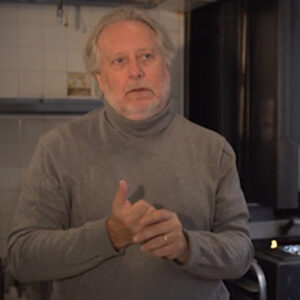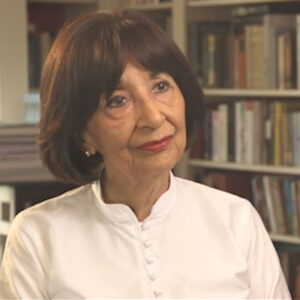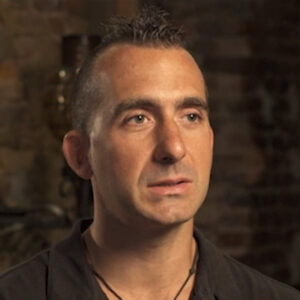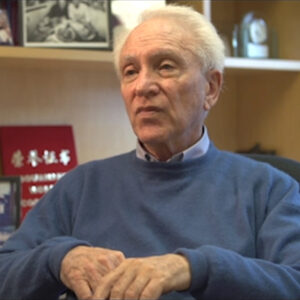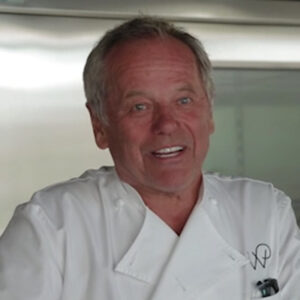Speaker 1 MFK Fisher was my great aunt, so she was my grandmother’s sister, and she I grew up in California, Northern California, in the San Francisco Bay Area, and she and my grandmother both lived up in Sonoma County. So and at this point, she was in her sixties and I was a kid. So my my memories of her are sort of childhood memories of what she was like in the 70s. Anyway, she was a sort of a seminal writer about food and about life in general all the way back in the 1930s and 40s when she got her start very young. And you know her the background on her story was that she heard my great grandfather, Rex Kennedy, was a newspaper man and had a newspaper in Whittier, California, and she grew up in writing for that paper at a very young age and writing a column when she was very young. And that sort of got her started as a writer. And eventually she also married very young and went to Europe at age 20 or something like that. And that was a very seminal trip.
Speaker 2 What was distinctive about her writing?
Speaker 1 I think, you know, it’s a little hard, I don’t have a huge amount of historical perspective, but I think that she was a she had a daring kind of tone, a way of writing that for the time, certainly in the 20s and 30s, was unusual for a woman to be writing in this way. So she could be she was a very elegant storyteller and she could be very opaque and mysterious and sensual and evocative and in a way, for a woman to be writing about such personal things. She she wrote about her marriage breaking up even while she was still technically married to to Al Fischer, her first husband falling in love with Dylan Parrish, her second husband. All of this is if you read the books that she wrote in the 30s. That’s all right there. She uses you know, she uses a code name for for Paris. But other than that, you know, she’s very confessional in some ways, very mysterious and others. So it’s a kind of a modern at the time, kind of shockingly modern way of writing, certainly for a woman or she was one of, I’d say, a group of women who did that. And, you know, the other thing, when I was working on my book, I was I was reading all her letters, a whole different kind of writing. You know, the writing in the books, the writing in The New Yorker magazine tended to be, you know, a little bit formal, quite beautiful. The writing in the letters was just full of gossip and news and funny and very direct. And I guess more like the person that I knew as a kid or what I remember of her as a kid.
Speaker 2 Tell us about Prevalence 1970 book and and where it set.
Speaker 1 My book is my book is Provence 1970. It’s really just the story of a coincidence in a way. That’s how it started for me, was discovering that MFK Fisher, my great aunt Julia Child, Paul Child, her husband, James Beard, Richard Olney, Simone Beck, Judith Jones, this group of seminal food people all found themselves together in Provence in 1970, in the winter, November, December. So that’s the idea. That’s in a way, is just the characters and the setting seemed so great. Then I started once I started researching it, you know, the more I looked, the more I found that this really was a real turning point in American cooking. And that was the story that I was really telling. Yes, I’m telling a story about these these wonderful characters and how they’re gossiping and eating and cooking and so forth. But then I’m also at another level telling the story of how America fell in love with food and fell in love with France. And then in 1970, things are changing and America is ready to do something else. Julia Child is she is the French chef on television, but she wants to do, you know, New England clam chowder and she wants to make Indian curry and she’s ready to move. And so international food is happening. Regional American food is happening. James Beard is hard at work on American cookery, which is his sort of opus about all the regional cooking in America. So they’re all moving in different directions. And then the crux of it, in a way, for me was just getting out from under the shadow of France and of continental snobbery and the sort of superiority, the European superiority that certainly when it came to matters of food and taste they all were aware of. So that was that was the story in the background of my book.
Speaker 2 How would you describe the relationship between your great aunt and James Beard?
Speaker 1 They just loved each other. It’s so funny the child’s introduced them. Another interesting thing about my book in 1970 is that he wrote these people. They were sort of iconic figures. Certainly now we think of them as these icons and they were all well along in their careers. Basically, they were like I said, they were 60 years old or somewhere in there, but they didn’t really know each other all that well. So in a way, the story in my book is also the story of these of these people kind of meeting and really getting to know each other. WMF and Beard had been introduced by the child’s at some point in the mid late sixties. They’d met once, but then here they were, you know, really for the first time, spending a lot of time together, driving around. I should just say that Beard was in Provence in 1970, signed up in a diet clinic. So he he was there desperately trying to lose weight. Meanwhile, of course, he’s going on these road trips with my great aunt and he’s hanging out at the child’s house and having wonderful dinners. And as you can imagine, he doesn’t lose any weight at all. And so they really did like each other. And you can tell from there, all of you from all the letters that they would write back and forth that they were that a lot of affection for each other.
Speaker 2 Tell us what you discovered about James Beard from your research for this book.
Speaker 1 James Beard was a you know, he was the godfather figure for me, he was the one, you know, famously child. Julia Child says in the beginning there was beard and he’s the one who started it all. You know, the the who got people really thinking and talking about food in a different way. And the thing to remember, which I wasn’t really aware of, because I’m not truly an expert historian on food or anything else. You know, there was this whole strand in America, especially post war of of kind of, you know, the science of cooking and and diet and health and everything should be convenient and fast and easy. And and it was it was not something that was meant to be enjoyed, had nothing to do with pleasure. It was about the housewife is at home and she needs to produce dinner as quickly and sensibly and and cheaply as possible. So there is a whole strain of that, the sort of that that that that’s at the same time you have the industrialization of food happening at the same time. So Biard comes along and says, wait a minute, you know, this food is delicious and wonderful. And and he writes about it in a in a sort of more literary way, although he’s also very practical, giving you recipes and so forth and his columns. But so for me, he was you know, he was about pleasure and and the pleasure of eating and the pleasure of food. And he obviously he was the kind of person who always needed to be have people around him. He was a social person. He loved other people. He loved talking. He loved gossip. He was not the greatest person to lock himself away in a room and finish the book he was meant to be finishing. That was really, really hard for him. I got I talked to Judith Jones a few times for this for my book, and she edited him over the years. And she has great stories of just trying to get into focus and work on some recipe. And then if the phone rang and it could be a reader in Dubuque calling to say, how do I do this recipe? And he would just stay on the phone for as long as it took because he really, really loved his readers and he loved to talk to people. He was a social person. He kept his phone number listed all those many years so that anyone who wanted to call him could could reach him. So that’s the
Speaker 2 it’s fantastic that you referred to that because we’ve interviewed it and she says, you know, the phone would ring and he would answer it with someone in Omaha. How do I make this right?
Speaker 3 Right. Get up and start making lunch. Right.
Speaker 1 Right. Exactly.
Speaker 2 So. What inspired you to write the book?
Speaker 1 The book started as a as a story I wrote for Travel and Leisure, I’m an editor at Travel Leisure. I write for the magazine. I did a story about X on Provence and I and I and my great aunt. And so I guess it was my great aunt that got me into this this this topic and wanting to write about it. And then through looking at her life, discovering that all of these characters were there at the same time. And that just seemed like a fun thing. So, you know, and, you know, the other thing is I am a I’m a food. I love to cook. I’m not an expert cook. But I did grow up in a family that took food awfully seriously in a good way. They didn’t we didn’t take it seriously, but we cooked a lot and we did it together and we enjoyed it both my grandmother, my great aunt, my mother, all all wonderful cooks. So it’s in the blood, I guess I would say.
Speaker 2 Did you ever meet James Beard?
Speaker 1 I never met James Beard. No, no. I met I met Julia Child one time and in Cambridge. But I never I never met James Beard.
Speaker 2 Do you have any recollections of, you know, when he passed, how that resonated?
Speaker 1 I don’t. I mean, James Beard, to me, you know, I discovered Beard is such an icon, you know, just the name James Beard. And but who he really was didn’t really occur to me to think about much until I was really researching this book and then then discovering what a sort of warm and generous person he was. And that, to me, you know, is is the key to him is that the generosity that he and he had toward toward everyone, you know, he Julia Child would say, well, you know, he would he was always looking out for younger for younger people, for new talent and trying to help them along and bring them along and and bring them into his fold. And of course, he wanted to be at the center of things all the while. The fact was that he would be, you know, in the middle of it all. But he was generous in the sense of wanting people to do well. There’s a there’s a scene as an amusing scene, I think, in my book, where only Richard Olney is another is a less well known author of cookbooks, brilliant writer, brilliant cook, the sort of cantankerous, misanthropic character, however. And he you know, Beard is eagerly trying to explain why I can help you. You know, we could get you to write an article for Gourmet magazine. Let me help you with that, or I can introduce you to the publishers of who do cookbooks back in New York, only lived in France and only is just completely dismissive and wants nothing to do with beard. And the dynamic between them is is just so perfect because you have a beard who is trying to his best to help and only who is. He’s a different generation. He’s, you know, he’s a little bit younger and he wants and he feels he’s impatient with all these this older generation of already successful. Writers and so forth and wants to do it on his own. So that dynamic you can see right there.
Speaker 2 What did you learn about James Beard’s relationship with Julia Child through your research?
Speaker 1 Once again, I think they really adored each other, you know, there are many there are many descriptions of them cooking together. I’m sorry,
Speaker 3 could you just start by saying James and Julia? Because then.
Speaker 1 Oh, sorry. Just say James and Julia. Yeah, James. James and Julia loved each other. They loved to cook together. There’s a there’s an amusing anecdote that Julia Child would tell about how they you know, they gave they gave themselves the nickname for for Julie and Jim. And it pronounced the J in the French French pronunciation, and they would make jokes about how they were. The judges are now in the kitchen cooking a soup. And and I think they really did. You know, he was a sort of flamboyant character. And in her own way, Julia was also a flamboyant character. She was a ham. She was a comic. She that’s why she was so great on television. Who knows why Beard was not so great on television. But anyway, they loved their company together in the kitchen and cooking. And I read numerous accounts of those scenes.
Speaker 2 What do you think was James Beard’s greatest contribution to the food world?
Speaker 1 I think Beard’s great contribution is is lifting was lifting American cooking to another level, I think that that had gotten you know, there was this this I’m sorry, I have to sort of sort of remember what is the word I’m looking for. Just help me out here. This is not domestic. What’s the class in the 1950s or 60s Home EC? Right, sorry. So I think Beard’s great contribution was was was being able to lift American cooking out of the realm of Home EC Home Economics, where people were taught how to cook in this sort of sensible way, utilitarian way. And here was he came along and said, no, food and cooking is isn’t art. It is a pleasure. It transcends, you know, home economics. And I think that was he was one of the great forces to bring that about in American cooking. And that’s that’s what I would say is his great contribution.
Speaker 2 And the letters that you found between James Spirit and your aunt, how would you describe his his his tone, his writing?
Speaker 1 You know, it’s funny, I read a lot of letters in researching my book from Beard and Julia Child and Paul Child and MFK Fisher and all of these people. And the thing that’s striking is they were all really great writers. They really were wonderful letter writers. And it’s an art form that unfortunately has been lost. So reading their letters is just delightful. They’re so funny, they’re well-written, they’re thoughtful. There’s jokes. There’s a there’s a camaraderie and a and a sense of of love that you find in those letters. Even, you know, I mentioned only earlier, there are some great letters between Olney and Beard. We’re really only talking about, you know, he’s he’s pining after some young man and oh, is he going to come back and very, very sort of personal back and forth, which is so different from the picture you get of of Aulnay as this bitter man later? Certainly. So, yeah. There’s a lot of affection and pleasure in those letters. Pleasure in finding the latest news. Pleasure and finding a new restaurant. Oh, my God. Have you have you heard what happened with Joe Baum over at Restaurant Associates? This. Oh, my God. This all that kind of news and gossip. I mean, Beard was the fount of all information and gossip. Certainly Julia Child was up in Cambridge. She knew nothing other than what I mean, I’m exaggerating, but she would say, we got to find out what’s going on. We’d better call Jim. And so, you know, Beard was he prized his role as being the source of all gossip and information. And and that’s what kept him in the mix and kept him in the centre of things, I think.
Speaker 3 A little more of that, more of the fabulous stories that you read, like gossip or, you know,
Speaker 1 OK, I have one, for example, in in in the winter of 1970, when when Beard and my great aunt and Julia were all in Provence together. This was also there is what was happening right around that same time. Craig Claiborne at The Times, who is another seminal figure in the food world, had decided to to leave the Times. You know, he’d had he’d had enough of writing restaurant reviews. He wanted to do more than just write write reviews. And he was going to launch his own little journal, a food journal. And he was going to travel the world and write about food and wine and restaurants and whatever he wanted to. And so consequently, there was an enormous amount of the thing to remember about Claiborne’s. Clayburn had invented the role of the New York Times food critic, restaurant critic, food editor, whatever his title was that had not existed before Craig came along and invented it. So and he was enormously powerful. I mean, he really was a powerful figure. And so he was going to he was going to step off that pedestal out of that role and who was going to take his place. So as you can imagine, all of these a James Beard spending and PMF and Julia are spending an awful lot of time wondering now who is going to take over for Craig Claiborne and should it be so and so? Could it be this person or that person? And oh, and then when they get back to the states, the first thing that beard beard has got catches this terrible cold on the flight from France back to New York. So he’s he’s you know, he hasn’t lost any weight. First of all, after the whole diet clinic, then he’s got this terrible you know, his legs are swollen. He’s having heart issues. He’s sort of hospitalized briefly, but he’s at home again. And he writes this letter to Julia saying, well, I’ve I’ve been scoping things out. I’m looking for the latest gossip. Just want you to know, you know, I’ve been yes, I’ve been a little bit held up because I had to be hospitalized, but I’m trying to find out what’s going on with the Craig Claiborne’s situation and who’s going to replace him. And, of course, he doesn’t have the answer, doesn’t know who is going to be yet. It’s all conjecture and and gossip. But that gives you a sense also how how small the food world was at that time. Today, the food world is an enormous operation with TV channels and restaurants and celebrity chefs and all kinds of stuff. In 1970, and for most of James Beard’s career, I would say the food world was small and it was and it was so small that everybody knew each other. So I’m sure you’ve come across this anecdote, which predates my book, but I do mention it when and it’s another Craig Claiborne story when when the time life had this enormous budget for the series of books that they were going to publish called the The Food, the Foods of the World Series, I guess it was called. And the first one was going to be the cooking of provincial France. And so they hired Julia Child to be a consultant and they hired MFK Fisher to write the text or at least the introductions to each chapter. And Michael Field was the editor of Old Putting. He was the impresario behind and putting all the recipes together. And Biard was even involved or some acolytes of Beard were involved. So everybody was it was like a gravy train because there is so much money coming out of this book. And then it finally came out and the same day of of the of the very glamorous book party for this book, Craig Claiborne writes the most scathing review in the times of this of this new cookbook, saying it’s entirely it’s not provincial French cooking. It’s all kind. It’s there’s no the recipes are not accurately provincial there. There’s plenty of cuisine stuff in there. And they don’t really know what they’re talking about. And it was really a slam on Michael Field anyway. Everyone was gossiping about it. And Nora Ephron, who, of course, later directed Julie and Julia, the very successful movie about Julia Child in nineteen sixty eight, wrote this brilliant magazine article, sort of a seminal magazine article in terms of the food world for New York magazine, just poking fun at every single person in the food world. And the basic joke of it is look how insular and self obsessed they are. And and and they all, you know, they’re all worrying about this Craig Claiborne interview. And, you know, there’s a scene at that party in that piece. Anyway, that’s a that just gives you a sense of the food world. And it’s and it’s sort of smallness and insularity. But also there’s something kind of wonderful about the fact that they all knew each other and how small it was. And as compared to now, where it’s really a whole a whole nother whole other, you know, level of, you know, it’s much bigger and a lot more money. So.
Speaker 3 Yeah, oh, yeah, I’m so sorry she can come around. No, she can’t. Five more minutes. Could she come in? Absolutely, absolutely. And I’ll just put
Speaker 2 my questions
Speaker 3 about his health. He was there a lot of letters of him talking to her about his when he was in the hospital or health and there’s changing his diet. I mean, I know at the end of his life he’s not going to change something.
Speaker 1 Right? There are no he doesn’t he doesn’t personally write a lot about his health. Everyone else does. You know, there are there are really sad letters between Julia Child and Paul Child and M.F. MF where they’re talking about, oh, my God, you know, what’s going on with Jim? He looks terrible. You know, he really he’s putting his best face on it, but he does not look well. This is in 1970. And did you see that leg sticking out from underneath the cuff of his pant? I mean, it looked that kind of stuff. So they’re really worried. And, you know, Julie and Paul were convinced he was on his last legs. He was going to die. Fortunately, he didn’t. He lived a whole lot longer and eventual of course, he did lose weight. So but at that point, he but he didn’t really you know, he he talked about it in an entirely joking way. You know, here I am. My my my leg is barely working. I’ve got to stick it up on this chair. And and then he you know, at some point he was prescribed these special boots that you had to wear that were sort of compression stockings, I guess they were called wear, you know, because he was he had too much fluid in his legs. So these would compress his legs and help his circulation. And he would just joke about how he thought he looked like a nobleman walking around with these compression stocking boots or whatever. And so he he made light of it always, you know. You know, I did find there’s another amusing stash of, you know, the the the the medical records from his diet clinic where the doctor at the diet clinic is trying to convince him you must lose weight, you know, for your existential well-being. You have to not just lose weight. Now, while you’re at the diet clinic, you have to continue and really make this diet a permanent thing, which, of course, for beard was so difficult because, you know, eating was his life. You know, I think I write in the book about for Beard going on a diet as an existential problem, because what he was about was cooking and eating and talking about food and drinking wine and to to not be able to. The diet he was on was very draconian. No salt, no sugar, no wine, no. You know, so it was it was it was it was tough. He however, as I said, always had a light touch, certainly in the letters that I read.


